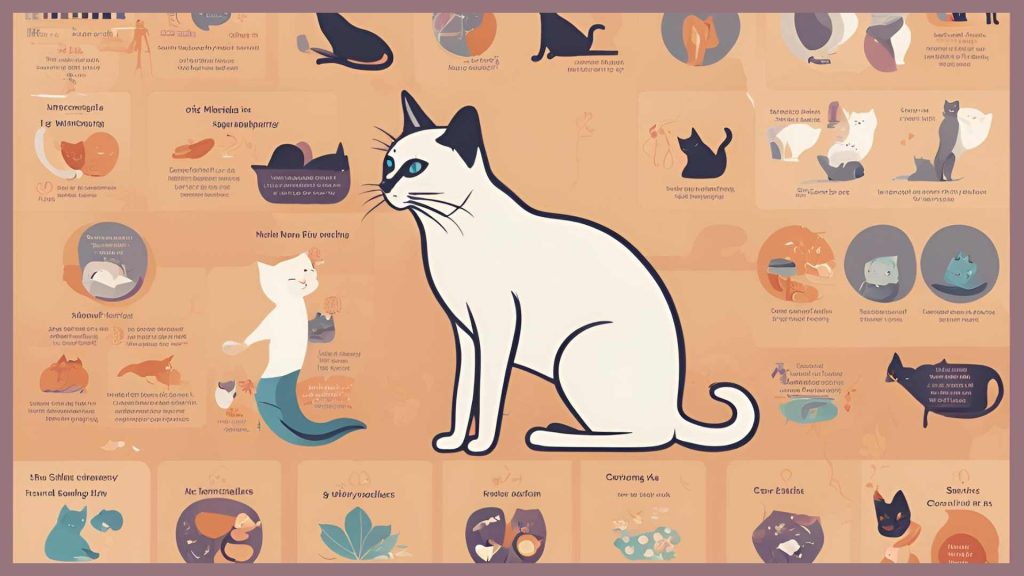As I look into my Siamese cat, Sophia’s blue eyes, I wonder how long we’ll be together. Siamese cats are known for living a long time, up to 20 years. This is longer than many other cat breeds, which usually live 12 to 15 years.
What makes Siamese cats live so long? How can we help our pets live their best lives? Let’s dive into the world of Siamese cat life expectancy together.
Introduction to Siamese Cats

Siamese cats have a rich history, coming from Thailand (formerly Siam). They were once sacred temple guardians. These cats have won the hearts of many with their looks and personalities.
Origins and History of the Breed
The Siamese cat is one of the oldest Asian breeds. They’ve been in Siam (now Thailand) for centuries. The Thai royal family valued them, seeing them as symbols of luck and prosperity.
In the late 19th century, they were brought to Europe and North America. They quickly became popular pets.
Distinctive Physical Features
Siamese cats stand out with their slender build and wedge-shaped head. Their almond-shaped, deep blue eyes are striking. Their short, glossy coat comes in seal, chocolate, blue, and lilac.
Over time, different subtypes have emerged. These include the traditional “Old-style” and the elongated “Modern” show-style Siamese.
Siamese cats are truly unique, with a rich history and a special look. They have won the hearts of many cat lovers. Their regal appearance and charming personalities make them unforgettable.
Siamese Cat Life Expectancy
Comparison to Other Cat Breeds
The Siamese cat is known for its long life among domestic cats. They can live up to 15 to 20 years. This is much longer than the 12 to 15 years many other cats live.
Their long life is due to their strong genes and the care from their owners. While some breeds may live a bit shorter, the Siamese cat is known for being a long-lived friend.
Let’s look at the average lifespans of other popular cat breeds:
- Burmese cats: 10-16 years
- Persian cats: 12-17 years
- Savannah cats: 15-20 years
- Egyptian Mau cats: 12-15 years
The Siamese cat’s long life makes them stand out. With the right care, they can enjoy their golden years with their family.
Factors Affecting Siamese Cat Life Expectancy
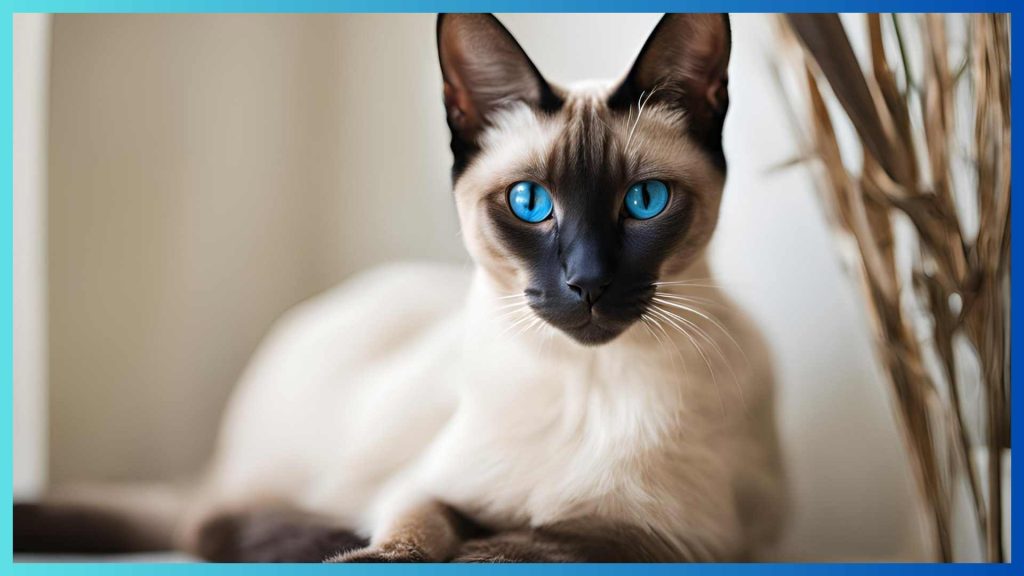
Siamese cats are known for living a long life, often between 12 to 20 years. Several important factors can affect their lifespan. These include their genetics, breeding, diet, exercise, and mental health.
Genetics and Breeding
Good breeding practices are key to a Siamese cat’s health. They can be prone to health issues like breathing problems and dental diseases. Choosing a reputable breeder who checks for these can help your cat live longer.
Diet and Nutrition
Good nutrition is vital for a Siamese cat’s health. They need a diet full of quality protein and low in carbs. Feeding them well and keeping them hydrated is important for their longevity.
Exercise and Mental Stimulation
Siamese cats are full of energy and curious. They need regular exercise and mental challenges. Playing with them, using puzzle toys, and other activities can keep them happy and healthy, which helps them live longer.
By focusing on these areas, you can help your Siamese cat live a long, happy life.
Common Health Concerns
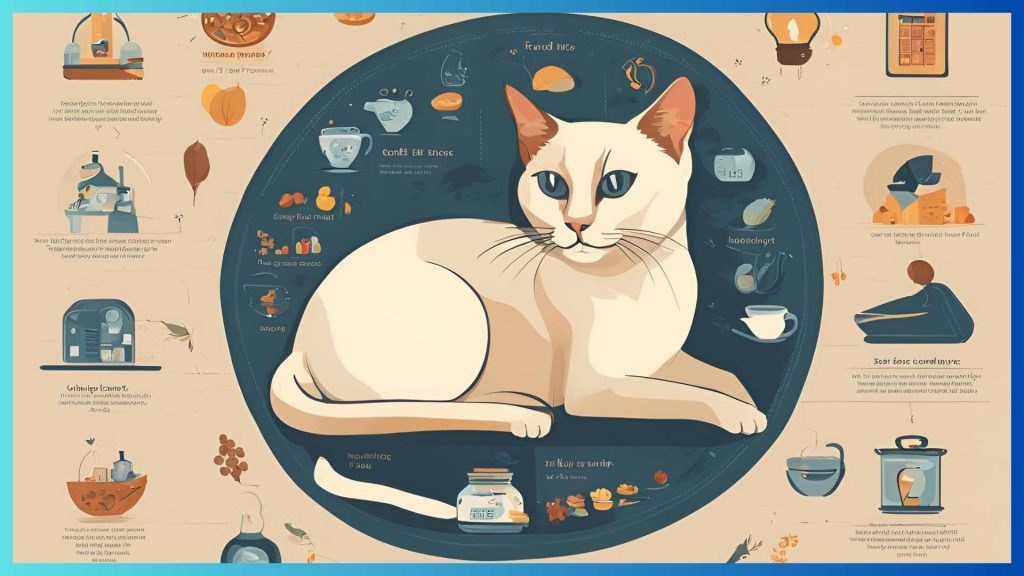
Siamese cats often live long lives, but they can face certain health issues. These include dental and oral problems, as well as heart diseases. Knowing about these concerns helps owners give their cats the best care.
Dental and Oral Issues
Siamese cats are at high risk for periodontal disease. This can cause tooth loss and gum inflammation. Regular dental check-ups and cleanings are key to keeping their teeth healthy and preventing siamese cat dental problems and siamese cat oral disease.
Cardiovascular Diseases
Siamese cats are also at risk for heart defects and other siamese cat heart disease and siamese cat cardiovascular conditions. These can shorten their lifespan if not caught early. Regular vet visits, including heart screenings, are vital for their heart health.
| Health Concern | Prevalence in Siamese Cats | Symptoms | Diagnostic Tests | Treatment Options |
|---|---|---|---|---|
| Feline Asthma | Siamese cats are more susceptible to asthma than other breeds, with around 1% of adult cats affected. | Coughing, wheezing, shortness of breath | X-rays, bronchoscopy, allergy testing, pulmonary function tests | Inhaled corticosteroids, bronchodilators, environmental adjustments |
| Progressive Retinal Atrophy (PRA) | PRA is a common inherited eye disease in Siamese cats, typically manifesting between 1.5-2 years of age. | Night vision problems, dilated pupils, eventual blindness | Ophthalmological exam, electroretinography, genetic testing | Maintaining quality of life as there is no cure |
| Amyloidosis | Siamese cats are predisposed to this genetic disorder, which involves the deposition of abnormal proteins in organs. | Loss of appetite, weight loss, vomiting, increased liver and kidney values | Blood tests, ultrasounds, biopsies, special staining methods | Relieving symptoms and slowing disease progression |
By understanding these common siamese cat health issues and being proactive, owners can help their Siamese cats live long, healthy lives.
Siamese Cat Lifespan: Indoor vs. Outdoor
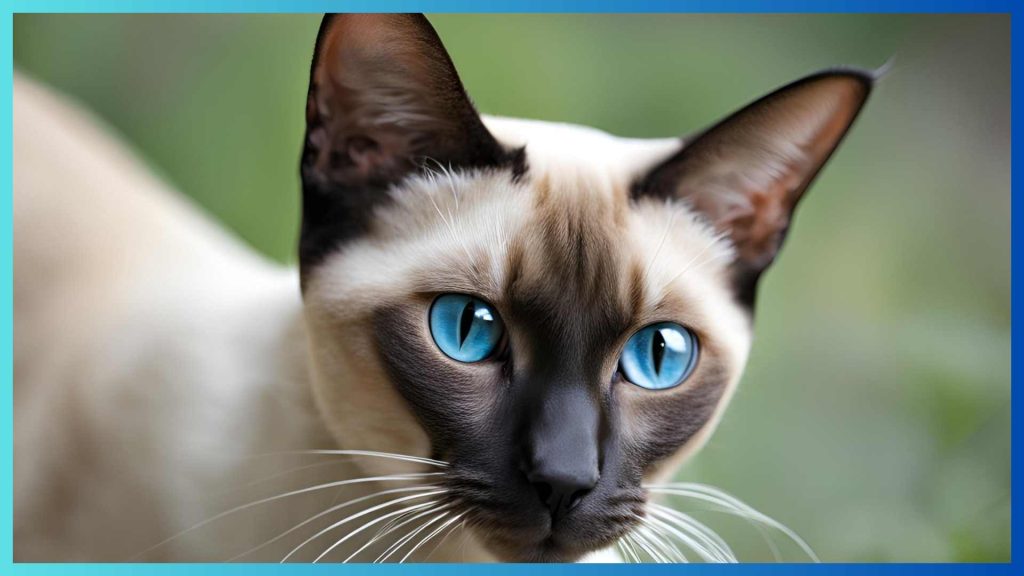
The place where a Siamese cat lives greatly affects their life span. Indoor Siamese cats usually live longer, up to 15 to 20 years. This is because they avoid injuries, illnesses, and dangers outside. Outdoor Siamese cats, on the other hand, face dangers like accidents and diseases, living about 12 to 15 years.
Studies show indoor Siamese cats live 15 to 17 years. Outdoor ones live 2 to 5 years. This big difference comes from the safer, healthier life indoors. With good care, indoor Siamese cats can live up to 18-20 years.
Outdoor Siamese cats have a shorter life because of dangers. They face predators, accidents, and diseases, leading to a shorter life than indoor cats. Keeping your Siamese cat indoors is best for their long life.
“The oldest cat on record lived to be 38 years old (Creme Puff), indicating the potential for cats to live longer with proper care.”
Keeping your Siamese cat indoors helps them live longer and healthier. Regular vet visits, a good diet, and fun activities are key. These things help your Siamese cat live a long, happy life.
Grooming and Care
Proper siamese cat grooming and care are key for their health and happiness. Regular siamese cat brushing removes loose hair and lowers hairball risks. Occasional siamese cat bathing keeps their coat and skin in top shape.
Brushing and Bathing
Brush your siamese cat once a week to keep their coat looking great. This simple step removes loose hair and spreads natural oils. It prevents matting and keeps their siamese cat coat shiny and smooth.
When bathing your siamese cat, use a gentle, cat-safe shampoo. Be careful not to get water in their ears.
Nail Trimming
Trimming your siamese cat‘s nails every 10-14 days is also important. It prevents overgrowth and potential problems. This quick task keeps their siamese cat nails in good shape and their paws healthy and comfy.
By keeping up with these grooming tasks, your Siamese cat will stay happy, healthy, and in great shape for life.
Keeping Your Siamese Cat Active
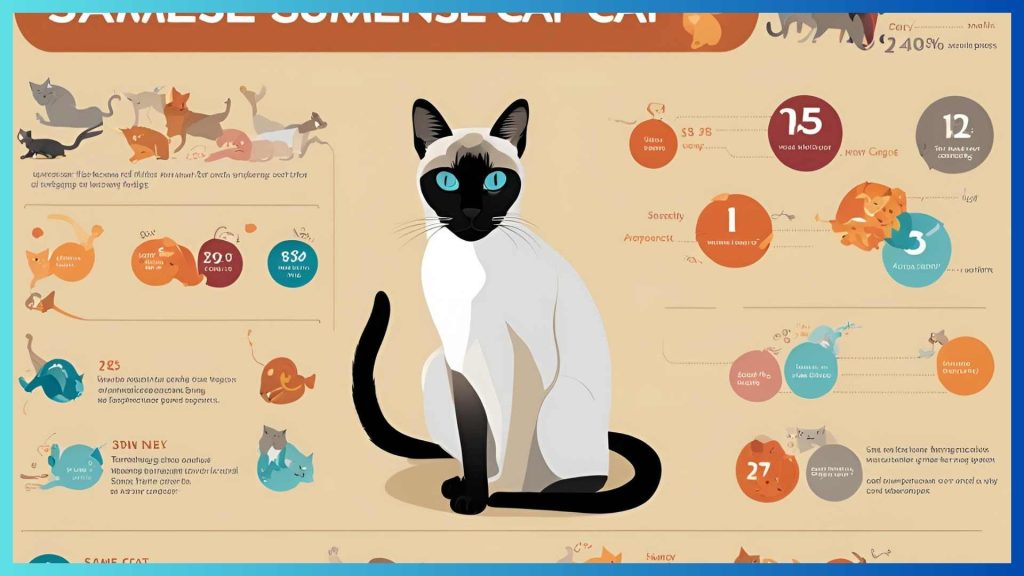
Siamese cats are very smart and love to move. They need lots of fun activities to stay happy and healthy. Toys and puzzle feeders are great for keeping them busy and active.
Interactive Toys and Puzzle Feeders
Get a range of toys that match your Siamese cat’s curiosity and energy. Laser pointers, wand toys, and puzzle feeders are perfect. Puzzle feeders are special because they make your cat think and hunt for food.
- Laser pointers: Use them to make your Siamese cat chase and jump.
- Wand toys: Attach feathers or ribbons to the end of a wand for fun play.
- Puzzle feeders: These toys make your cat work to get their food, keeping them sharp.
Playing with your Siamese cat often is key. It keeps them fit, happy, and healthy. A happy Siamese cat is a healthy one.
Training and Socialization
Siamese cats are known for being social and smart. They respond well to training and socialization. Using positive reinforcement methods like clicker training and rewarding good behavior strengthens your bond. It also encourages good habits.
Training and socializing your Siamese cat improves their behavior. It also keeps their mind active and supports their health. By focusing on Siamese cat socialization and using positive reinforcement, your cat will become well-adjusted and obedient.
Positive Reinforcement Methods
Positive reinforcement is key for Siamese cat training. It rewards your cat for good behavior, like sitting or coming when called. This approach helps your Siamese cat understand what actions are rewarded.
- Clicker training: A small device makes a distinct sound. It marks the exact moment your Siamese cat does the right thing.
- Treat-based rewards: Giving your Siamese cat treats or small portions of food rewards their good behavior.
- Praise and affection: Verbal praise, petting, and affection also reinforce good behavior.
Using these positive reinforcement methods in training and socialization shapes your Siamese cat’s behavior. It builds a stronger bond and supports their well-being.
Veterinary Care and Preventative Measures
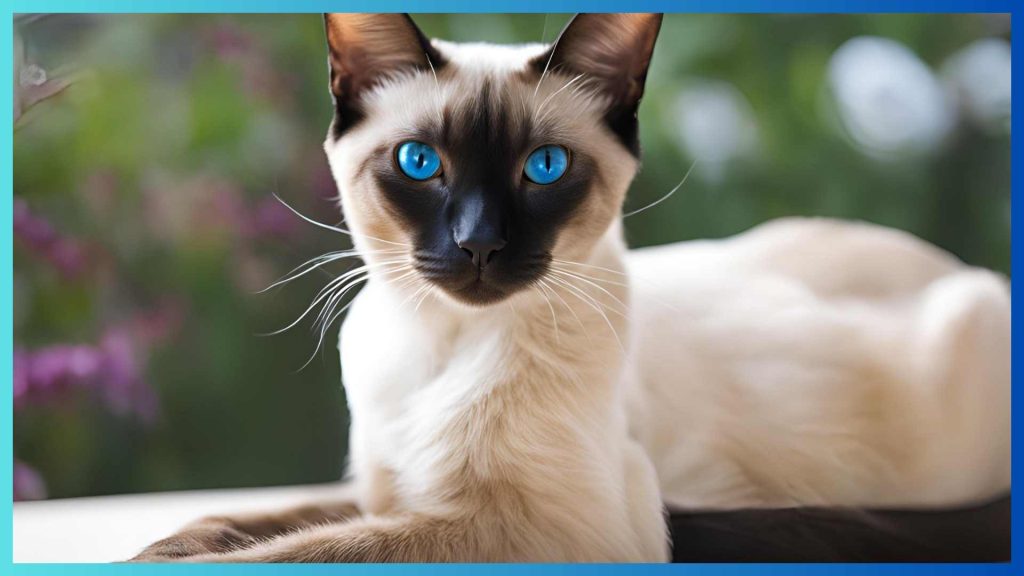
Keeping your Siamese cat healthy means regular vet visits and care. Make sure they get all needed shots, like for feline viral rhinotracheitis and rabies. Also, use a good parasite control plan to fight fleas, ticks, and worms.
Vaccinations and Parasite Control
Annual vet visits are key for Siamese cats. Take your cat for check-ups at least once a year. Rabies shots are needed every year, and FVRCP vaccines might need updates every one to three years.
Spaying or neutering is also vital. It helps prevent infections and cancers. Don’t forget about dental care. Regular dental checks and cleanings can stop tartar, gingivitis, and periodontal disease.
Flea and tick prevention is a must for all cats. These pests can spread diseases. Use regular worming meds or fecal tests to keep roundworms, hookworms, and tapeworms away.
Good vet care and prevention can greatly improve your Siamese cat’s life. Regular vet visits can catch health problems early, making a big difference.
Siamese Cat Life Expectancy: How Long Do They Live?
Siamese cats live a long life, often between 15 to 20 years. This is longer than most cats, which live 12 to 15 years. Their long life is due to their strong genes, the care from their owners, and health checks.
Vets say indoor Siamese cats can live 16 to 18 years. Some even live past 20. Outdoor cats, on the other hand, live about 13 to 14 years. This shows why keeping them indoors is safer.
Siamese cats aren’t the only long-lived cats. The Balinese and Ragdoll breeds also live long, up to 25 years. The Burmese breed is even more remarkable, with one cat living up to 35 years.
Thanks to better vet care and health checks, cats are living longer. Knowing what Siamese cats need helps them live a long, happy life.
Conclusion
Siamese cats are loved for their long lives, often reaching their late teens or early twenties. Knowing what affects their life span, like genetics and diet, helps owners care for them better. A good diet, exercise, and regular vet visits are key to their health.
By following these care tips, Siamese cats can live long, happy lives. They are smart and loving, making great friends for many years. With the right care, they can thrive and bring joy to your home.
Understanding Siamese cat health is crucial for their well-being. Whether you’re getting a Siamese or already have one, knowing how to care for them is important. This way, they can live a vibrant and long life, just like their beautiful looks.
FAQ
Q: What is the typical lifespan of a Siamese cat?
A: Siamese cats live a long life, often between 15 to 20 years. Their long life is thanks to their strong genes and the care from their owners.
Q: How does the Siamese cat’s lifespan compare to other cat breeds?
A: Siamese cats live longer than most cats, which usually live 12 to 15 years. They are among the longest-living domestic cat breeds.
Q: What factors can impact the lifespan of a Siamese cat?
A: Several factors can affect a Siamese cat’s life span. These include their genes, diet, exercise, and veterinary care.
Q: Are Siamese cats prone to any health issues that can affect their lifespan?
A: Yes, Siamese cats may face health problems like dental issues and heart diseases. These need careful monitoring to help them live longer.
Q: Do indoor Siamese cats live longer than those allowed outdoors?
A: Yes, indoor Siamese cats usually live longer, up to 15 to 20 years. This is because they avoid dangers and illnesses.
Q: What grooming tasks are important for maintaining a Siamese cat’s health and longevity?
A: Brushing, bathing, and trimming nails are key for a Siamese cat’s health. These tasks help keep them well and long-lived.
Q: How can providing mental stimulation and an active lifestyle benefit a Siamese cat’s lifespan?
A: An active life with toys and training keeps a Siamese cat happy and healthy. It helps them live longer and better.
Q: What preventative veterinary care measures are important for Siamese cats?
A: Regular vet visits, shots, and parasite control are vital. They help keep Siamese cats healthy and long-lived.

